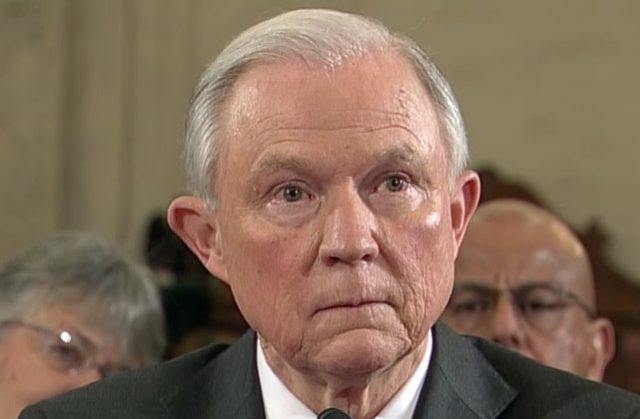
An internal email from the Federal Bureau of Investigation (“FBI”) severely undermines Attorney General Jeff Sessions‘ story about why he failed to list certain foreign contacts on a federal disclosure form, according to former White House ethics attorney, Walter Shaub.
Multiple media outlets, including CNN, yesterday seized upon that same FBI email as evidence that Sessions’ story was bolstered by the document obtained through a Freedom of Information Act (“FOIA”) request by Right WingWatch. CNN’s Evan Perez wrote, “The FBI email from March bolsters the explanation by the Justice Department for why Sessions didn’t disclose contacts with the Russian ambassador in his application for a US security clearance.”
Today, via Twitter, Shaub analyzed the email and came to the conclusion that most commentators have been reading the FOIA’d FBI document incorrectly. Shaub essentially claims that rather than vindicating Sessions, the FBI email actually undermines his story.
Shaub posted the email on Twitter with the following explanation spread across multiple tweets. He wrote:
This email does not corroborate the DOJ’s explanation, which was that he got advice from FBI “In filling out the SF-86 form.” The email says that Sessions’ assistant claims to have spoken with [sic] FBI agent in December during the background investigation. But Session [sic] completed the form on Nov. 3. So even if this Dec. conversation really did occur, it was not while Sessions was “filling” out the form.
When the story about Sessions’ lack of disclosure initially broke months ago, Department of Justice (“DOJ”) spokesman Ian Prior said, “In filling out the SF-86 form, the Attorney General’s staff consulted with those familiar with the process, as well as the FBI investigator handling the background check, and was instructed not to list meetings with foreign dignitaries and their staff connected with his Senate activities.”
The unclassified FBI email reads, in relevant part:
As requested, I received a telephone call from Peggi Hanrahan, Confidential Assistant to [Jeff Sessions]…Hanrahan inquired as to whether or not she previously asked me if Senator Sessions needed to list foreign contacts on his SF-86 while on official government business when his background investigation was being conducted in December 2016. Hanrahan advised that in past U.S. government backgrounds the senator was not required to list foreign contacts while on official government business. I advised Ms. Hanrahan that I did not recall a conversation I had with her in regards to this but that for purposes of the SF-86, he was not required to list foreign government contacts while on official government business unless he developed personal relationships from such contacts. I further advised her that I would refer this matter to my supervisor.
Sessions apparently filed the SF-86 form on November 3, 2016–a few days before the 2016 presidential election.
While it may appear strange that Sessions filed a transition document before the election even took place, it’s apparently not unheard of and makes sense in the context of preparing for an orderly and seamless transition between White House and Executive Branch staff, according to Shaub.
In a Twitter thread yesterday, Shaub began sniffing around the edges of Sessions’ story about being misled by the FBI and found that story wanting. Shaub wrote:
The claim that FBI told Sessions to omit foreign contacts makes no sense to me. Presidential nominees fill out the security clearance form (SF-86) in OPM’s e-filing system (e-QIP) before FBI gets involved. That form has a whole section on foreign contacts. Sessions would have completed the SF-86 and submitted it to OPM (which would, in turn, send it to the FBI) around the same time he completed his OGE Form 278 (financial disclosure form). He did that in November, but the story says the email exchange with FBI was in March. It’s possible but unlikely that an FBI agent was assigned to his background investigation yet when he was still completing the form. So I’m having trouble accepting this quote. DOJ could clear this up by producing a statement from the unnamed FBI agent.
To date, the DOJ has yet to provide any such statement from the unnamed FBI agent. Rather, the agent in question claims to have no memory of the conversation undergirding Sessions’ claim.
This is a breaking story. Law&Crime will update this space as more information becomes available.
[image via screengrab/CBS]